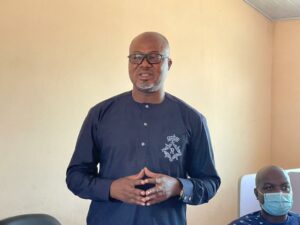Help save the fishery industry from collapsing

Mr Richster Nii Amarh Amarfio, Secretary, Ghana Tuna Association, has urged Tuna sector industry to restore the ‘lamp of light’ by taking measures to protect the industry from collapsing.
He said people put waste in the sea and turned round to asked authorities to help save the fishery industry; fish growth depends on the water body, “so if you keep destroying the waterbody, it will reduce the quantity of fish volume and also reduce the activity to sustain the fish for both human and marine”.
Mr Amarfio stated at the sixth Ghana News Agency-Tema Regional Office monthly stakeholder engagement and workers’ appreciation seminar, which is aimed at bringing together both state and non-state actors together to address national issues.
He continued that, the sea was there but the fishes were dying, due to disregard for the environment and unhealthy practices, “the fishes need to be treated well”.
The Tuna sector have lamp, ‘that lamp of light that regulated the industry. Our fishery industry is seriously going down because we hardly take measures that protect the sea.
“If we keep doing the same thing, we expect to get the same result and the same results means that our sector is going down”.
Mr Amarfio lamented that Tema Metropolitan Authority (TMA) did have a place to process untreated waste product, so all were channel into the water which ended up in the sea.
“Most of the companies also channel their untreated waste into the sea. We are killing the sea with these unhealthy practices”.
Mr. Francis Ameyibor, the Ghana News Agency, Tema Regional Manager, said that the stakeholder engagement, which comes on the last Wednesday of every month, was a progressive media caucus platform created to give the opportunity to both state and non-state stakeholders to interact with journalists and address national issues.
He said modern journalism practices demanded a comprehensive dynamic approach to issues which affected society, through which the media must provide a platform for proactive engagement and exchange of ideas towards shaping national developmental.
Mr Ameyibor noted the GNA-Tema operations now hinges more towards partnership and advocacy journalism, which focused on providing a platform for citizens to share key information needed to make the best possible decisions about national issues, community development, protection of society and enhance governance.
“We have progressed from docile journalistic practices where media practitioners depend solely on projecting agenda set by others. Journalists cannot claim to be agenda setters when they are only mirroring what someone wants them to project,” he said.
Mr Ameyibor noted; “We cannot deny the fact that the old analogue way of news gathering has long passed; news gathering and dissemination cannot wait for two seconds, we are in the fast lane, traditional media practitioners must catch up with the fast-moving new media news train in order to remain relevant”.
Other speakers include: Mr Irwin Cofie, SIC Insurance Deputy Head of Marketing; Mrs Cunthia Kwarten Tufuor SIC Tema Area Manager; Ms Cynthia Twumasi, Deputy Area Manager who spoke on Fire Insurance and Homeplus Policy; and Mrs Doris Gorman, Tema Municipal Director of Information Service Department.
Source: GNA
